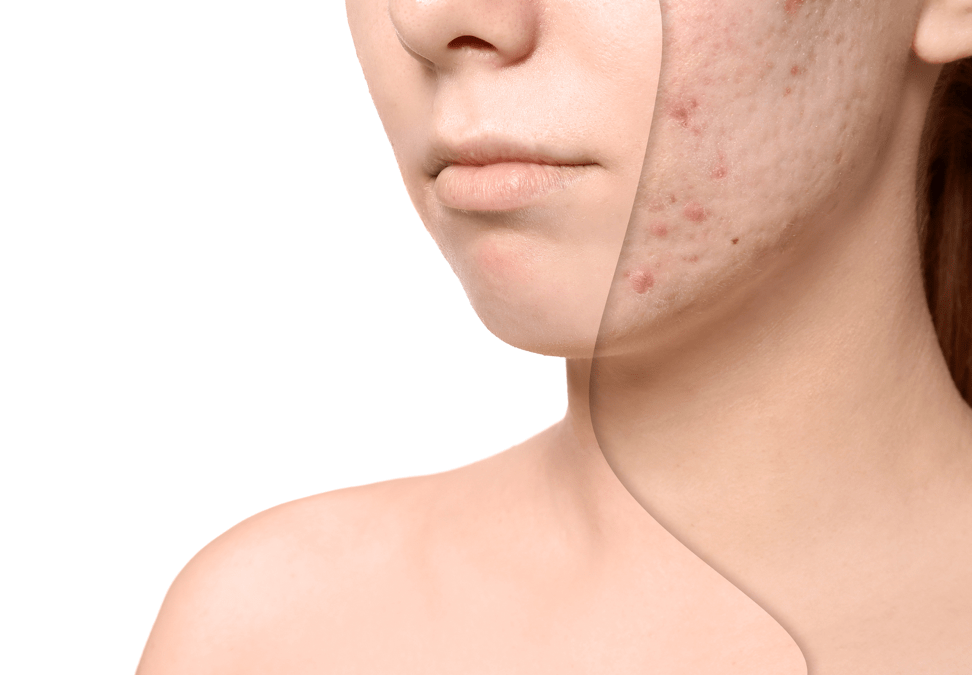
Unfortunately, there is no secret miracle device or remedy that can make your scars disappear. But this doesn’t mean that you cannot get rid of acne scars on your face. Most of what you think as acne scars are post-inflammatory hyper-pigmentation on your skin rather than a scar. Luckily, there are special remedies that can help reduce discoloration and improve your skin tone.
Below are 7 treatments, both medically approved and home remedies, that can help you treat acne scars(aka hyper-pigmentation) and improve your appearance.
1. Dermabrasion
Dermabrasion is one of the most effective non-invasive procedures for face scars and hyperpigmentation removal. It uses a rotating device that removes the upper layer of skin. When the skin grows back, it becomes smoother and clearer from post-inflammatory pigmentations. This procedure can help you reduce the appearance of acne scars, age spots, and even wrinkles.
This procedure isn’t suitable for people taking oral acne medication, those with a family history of keloids, and for patients with burn scars. If you have active acne breakouts or other pus-filled skin conditions, this procedure can aggravate them.
2. Alpha hydroxy acids
Alpha hydroxy acid is a common ingredient of acne treatment remedies. This acid helps to remove dead skin cells and prevent pores clogging. When using alpha hydroxy acid regularly, it can help relieve post-inflammatory hyperpigmentation and reduce acne scars’ appearance. These acids gently exfoliate the upper layer of the skin, promote collagen production, and improve the absorption of other skincare products.
Alpha hydroxy acid at a concentration of 10% or less as a part of the cream is generally safe. But for some people, it may cause sensitivity to light, skin irritation, discoloration, and redness. The products with a higher concentration of alpha hydroxy acid should be used only if prescribed by a dermatologist.
3. Chemical peels
Chemical peels aren’t the kind of masks or creams that you apply at home. This is a strong acid that helps remove the upper layer of the skin. This procedure needs to be performed in the dermatologist’s office to prevent severe skin burns. Chemical peels can help you reduce the appearance of hyperpigmentation, acne scars, fine lines, and uneven skin tone. If you are receiving a deep peel, your doctor may suggest numbing the area with a topical anesthetic.
It is essential to follow the doctor’s recommendations to prevent pigmentation, scarring, infections, and other possible side effects. After the procedure, your skin may be red and swollen. It can take up to two weeks for the skin to completely recover after a deep peel.
4. Lactic acid
Lactic acid is a gentle peel that helps remove dead skin cells, reduce the appearance of acne scars, and improve the overall texture of the skin. When using this acid, it is important to apply sunscreen on the face even in cloudy weather. Neglecting sunscreen can cause hyperpigmentation and increase the risk of sunburn.
Because of possible side effects, start with products that contain lactic acid in small doses. Apply it on the small area of skin to test whether your skin is sensitive to these ingredients.
5. Laser resurfacing
Laser resurfacing is a procedure that uses a laser instrument to remove the top layers of your skin. It helps eliminate dead skin cells, promote skin regeneration, and reduce the appearance of acne scars. Because laser heats the skin layers, it boosts the production of collagen. This helps achieve a smoother and more even skin appearance. like any in-office treatment, this procedure has certain risks, including swelling, scarring, infection, and discoloration.
After the procedure, it is important to keep the area covered with a bandage until it’s completely healed. The doctor can prescribe you special ointments and serums to speed up healing processes and prevent infections.
6. Retinoids
Topical retinoids are another effective remedy that can help you remove acne scars at home. This remedy improves the skin texture, reduces the appearance of hyperpigmentation, and boosts your skin cell regeneration. When used regularly, retinoids can soothe the skin and make acne scars less noticeable. Just like lactic acid, retinoids can make your skin sensitive to sunlight. For this reason, it is crucial to apply sunscreen when using retinoids.
There are a lot of creams and serums with retinoids on the market. Most of them have a low concentration of retinoids that can help prevent skin damage. But your dermatologist can also prescribe you higher concentrations for severe acne scars treatment.
7. Microneedling
Microneedling is a cosmetic procedure that uses small needles to injure the skin. This promotes rebuilding of the deep layer of the skin. This procedure shows amazing results in acne scars, stretch marks, rosacea, and skin pigmentation treatment. During the procedure, your doctor may use microneedling to deposit medication like vitamin C to the deeper layers of your skin. This improves the treatment of certain cosmetic issues like acne scars. You can administer this treatment at home using a plasma pen. What does a plasma pen cost? Don’t worry because the benefit that you can get is way more compared to the cost.
Microneedling is generally considered safe, but just like any cosmetic procedure, it has several risks. The side effects of microneedling may include swelling, bruising, redness, infection, skin pigmentation, and discomfort. You may be a bad candidate for microneedling treatment if you have active skin infections or keloid scarring.